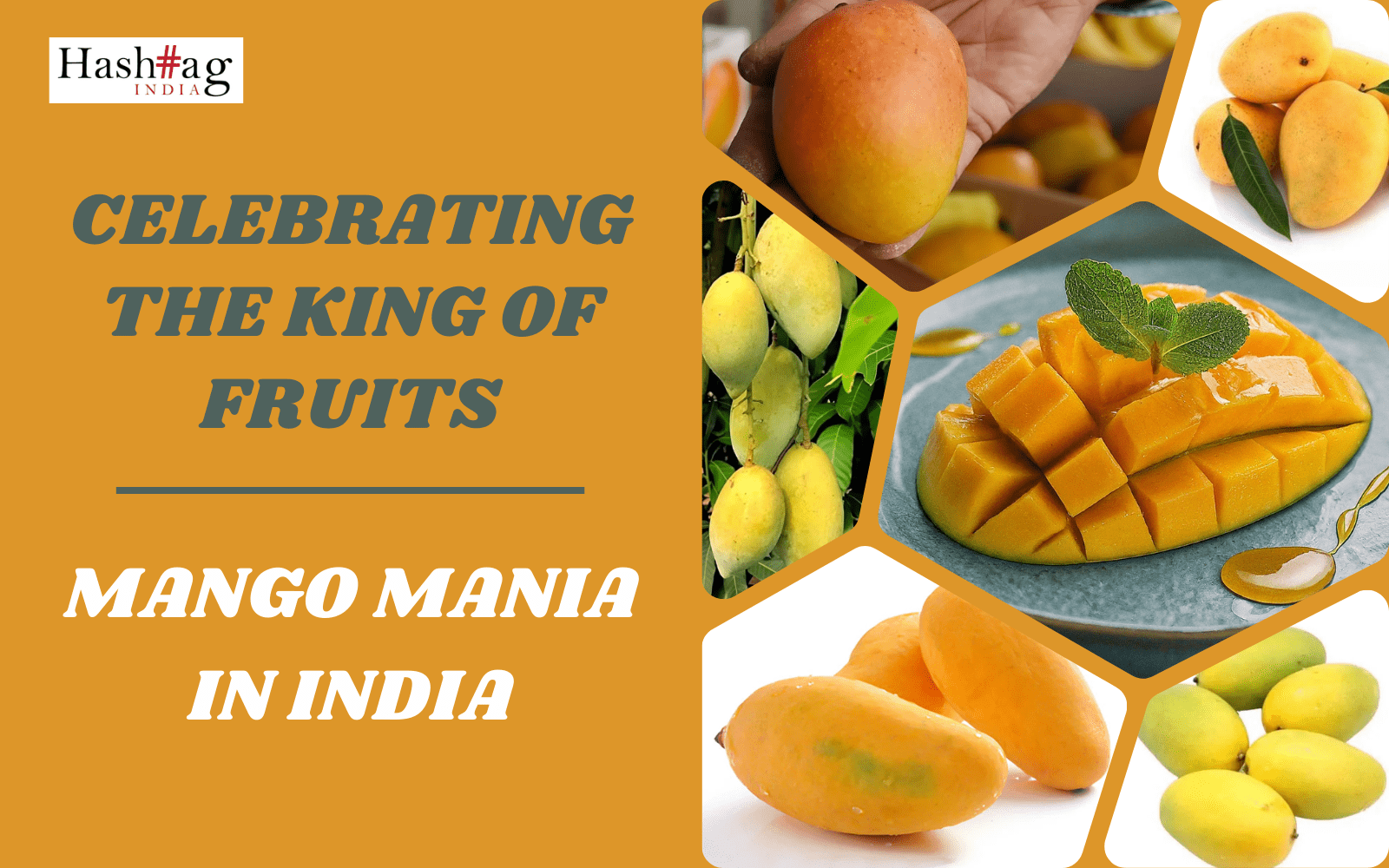Mangoes are the epitome of Indian summers, with their sweet aroma and velvety texture captivating the hearts of millions. With over 1,000 varieties grown across the country, India is the largest producer of mangoes in the world. From the succulent Alphonso to the tangy Langda, each variety has its unique flavor profile and cultural significance. In this article, Hashtag India Magazine delves into the world of Indian mangoes, exploring their history, cultural significance, and health benefits.
A Brief History of Mangoes in India
Mangoes have been cultivated in India for over 4,000 years, with records of mango cultivation dating back to the Indus Valley Civilization. The fruit was considered a delicacy in ancient India, with the Mughal Empire being particularly fond of mangoes. In fact, the Mughal emperor Akbar was known to have planted over 100,000 mango trees in his orchards.
Popular Mango Varieties in India
India is home to over 1,000 varieties of mangoes, each with its unique flavor, texture, and color. Here are some of the most popular mango varieties in India
1. Alphonso Mangoes: The King of Mangoes
Alphonso mangoes are widely regarded as the king of mangoes in India. Native to Maharashtra, these mangoes are known for their sweet, creamy flavor and vibrant orange color. Alphonso mangoes are often eaten fresh, used in salads, or made into smoothies. They’re also used in traditional Indian desserts like mango lassi and mango kulfi.
Benefits: Alphonso mangoes are rich in vitamins A and C, potassium, and fiber, making them an excellent addition to a healthy diet.
2. Kesar Mangoes: The Queen of Mangoes
Kesar mangoes are grown primarily in Gujarat and are known for their distinctive saffron-colored flesh and sweet, slightly tangy flavor. These mangoes are often eaten fresh, used in salads, or made into smoothies. They’re also used in traditional Indian desserts like mango barfi and mango halwa.
Benefits: Kesar mangoes are rich in antioxidants, vitamins A and C, and potassium, making them an excellent addition to a healthy diet.
3. Langda Mangoes: The Flavorful Delight
Langda mangoes are native to Varanasi and are known for their unique flavor, which is often described as a combination of sweet and tangy. These mangoes are often eaten fresh, used in salads, or made into smoothies. They’re also used in traditional Indian desserts like mango lassi and mango kulfi.
Benefits: Langda mangoes are rich in vitamins A and C, potassium, and fiber, making them an excellent addition to a healthy diet.
4. Chausa Mangoes: The Sweet and Tangy Delight
Chausa mangoes are grown primarily in Bihar and are known for their sweet, slightly acidic flavor and firm texture. These mangoes are often eaten fresh, used in salads, or made into smoothies. They’re also used in traditional Indian desserts like mango barfi and mango halwa.
Benefits: Chausa mangoes are rich in antioxidants, vitamins A and C, and potassium, making them an excellent addition to a healthy diet.
5. Himayat Mangoes: The Sweet and Creamy Delight
Himayat mangoes are native to Telangana and are known for their sweet, creamy flavor and vibrant orange color. These mangoes are often eaten fresh, used in salads, or made into smoothies. They’re also used in traditional Indian desserts like mango lassi and mango kulfi.
Benefits: Himayat mangoes are rich in vitamins A and C, potassium, and fiber, making them an excellent addition to a healthy diet.
6. Baiganpalli Mangoes: The Sweet and Tangy Delight
Baiganpalli mangoes are grown primarily in Andhra Pradesh and are known for their sweet, slightly tangy flavor and firm texture. These mangoes are often eaten fresh, used in salads, or made into smoothies. They’re also used in traditional Indian desserts like mango barfi and mango halwa.
Benefits: Baiganpalli mangoes are rich in antioxidants, vitamins A and C, and potassium, making them an excellent addition to a healthy diet.
7. Totapuri Mangoes: The Sweet and Creamy Delight
Totapuri mangoes are native to Karnataka and are known for their sweet, creamy flavor and vibrant orange color. These mangoes are often eaten fresh, used in salads, or made into smoothies. They’re also used in traditional Indian desserts like mango lassi and mango kulfi.
Benefits: Totapuri mangoes are rich in vitamins A and C, potassium, and fiber, making them an excellent addition to a healthy diet.
8. Neelam Mangoes: The Sweet and Tangy Delight
Neelam mangoes are grown primarily in Tamil Nadu and are known for their sweet, slightly tangy flavor and firm texture. These mangoes are often eaten fresh, used in salads, or made into smoothies. They’re also used in traditional Indian desserts like mango barfi and mango halwa.
Benefits: Neelam mangoes are rich in antioxidants, vitamins A and C, and potassium, making them an excellent addition to a healthy diet.
9. Bangnapalli Mangoes: The Sweet and Creamy Delight
Bangnapalli mangoes are native to Andhra Pradesh and are known for their sweet, creamy flavor and vibrant orange color. These mangoes are often eaten fresh, used in salads, or made into smoothies. They’re also used in traditional Indian desserts like mango lassi and mango kulfi.
Benefits: Bangnapalli mangoes are rich in vitamins A and C, potassium, and fiber, making them an excellent addition to a healthy diet.
Cultural Significance of Mangoes in India
Mangoes play a significant role in Indian culture and cuisine. In many Indian households, mangoes are considered a symbol of prosperity, good fortune, and love.
Here are a few ways in which mangoes are culturally significant in India:
1. Mango Festivals: Many Indian states, including Maharashtra, Gujarat, and Uttar Pradesh, celebrate mango festivals to mark the arrival of the mango season.
2. Mango-Based Cuisine: Mangoes are a staple ingredient in many Indian dishes, including salads, smoothies, and desserts.
3. Mango as a Symbol of Love: In many Indian cultures, mangoes are considered a symbol of love and romance. In fact, mangoes are often exchanged as gifts between loved ones during special occasions.
Health Benefits of Mangoes
Mangoes are not only delicious, but they’re also packed with nutrients and antioxidants.
1. Rich in Vitamins and Minerals: Mangoes are rich in vitamins A and C, potassium, and fiber, making them an excellent addition to a healthy diet.
2. Antioxidant Properties: Mangoes contain a range of antioxidants, including flavonoids and phenolic acids, which can help protect against oxidative stress and inflammation.
3. Supports Eye Health: The high levels of vitamin A in mangoes make them an excellent fruit for supporting eye health and reducing the risk of age-related macular degeneration.
Mangoes are truly the king of fruits in India, with their sweet, creamy flavor and velvety texture making them a staple of Indian cuisine and culture. With over 1,000 varieties of mangoes grown in India, there’s something for everyone to enjoy. Whether you’re a fan of Alphonso, Kesar, or Langda mangoes, there’s no denying the cultural significance and health benefits of this delicious fruit. So next time you bite into a juicy mango, remember the rich history, cultural significance, and health benefits that make mangoes truly the king of fruits.
























